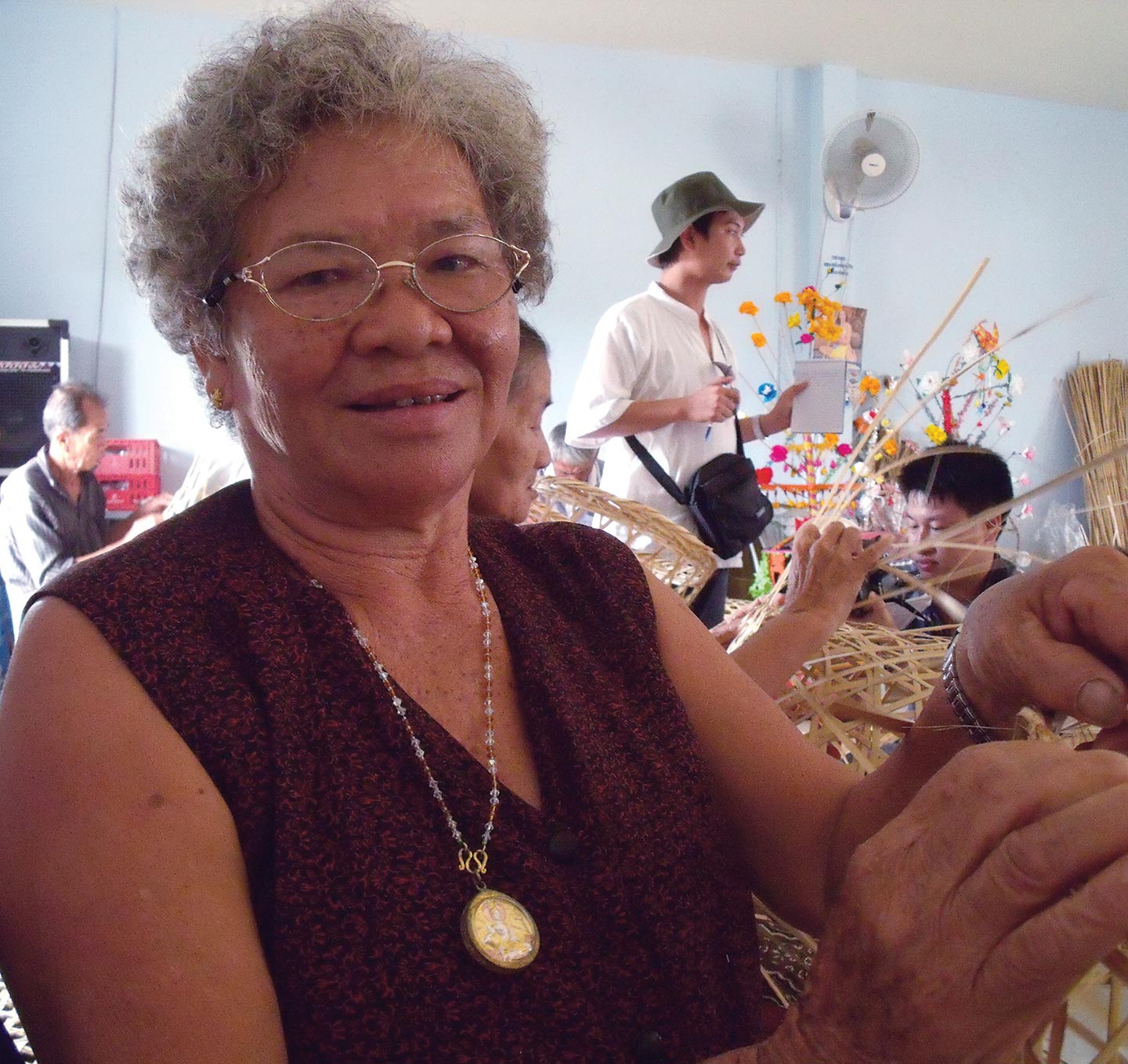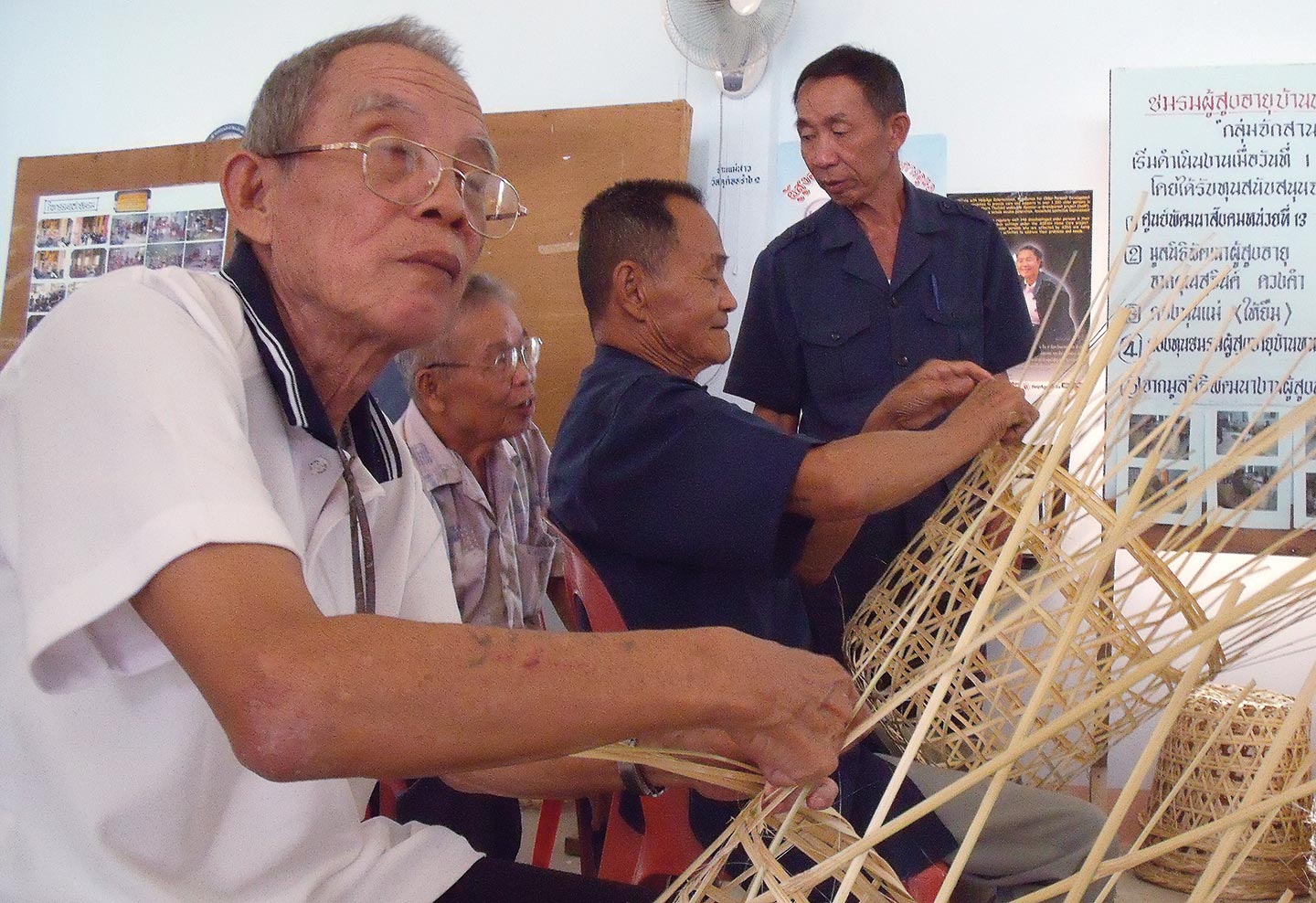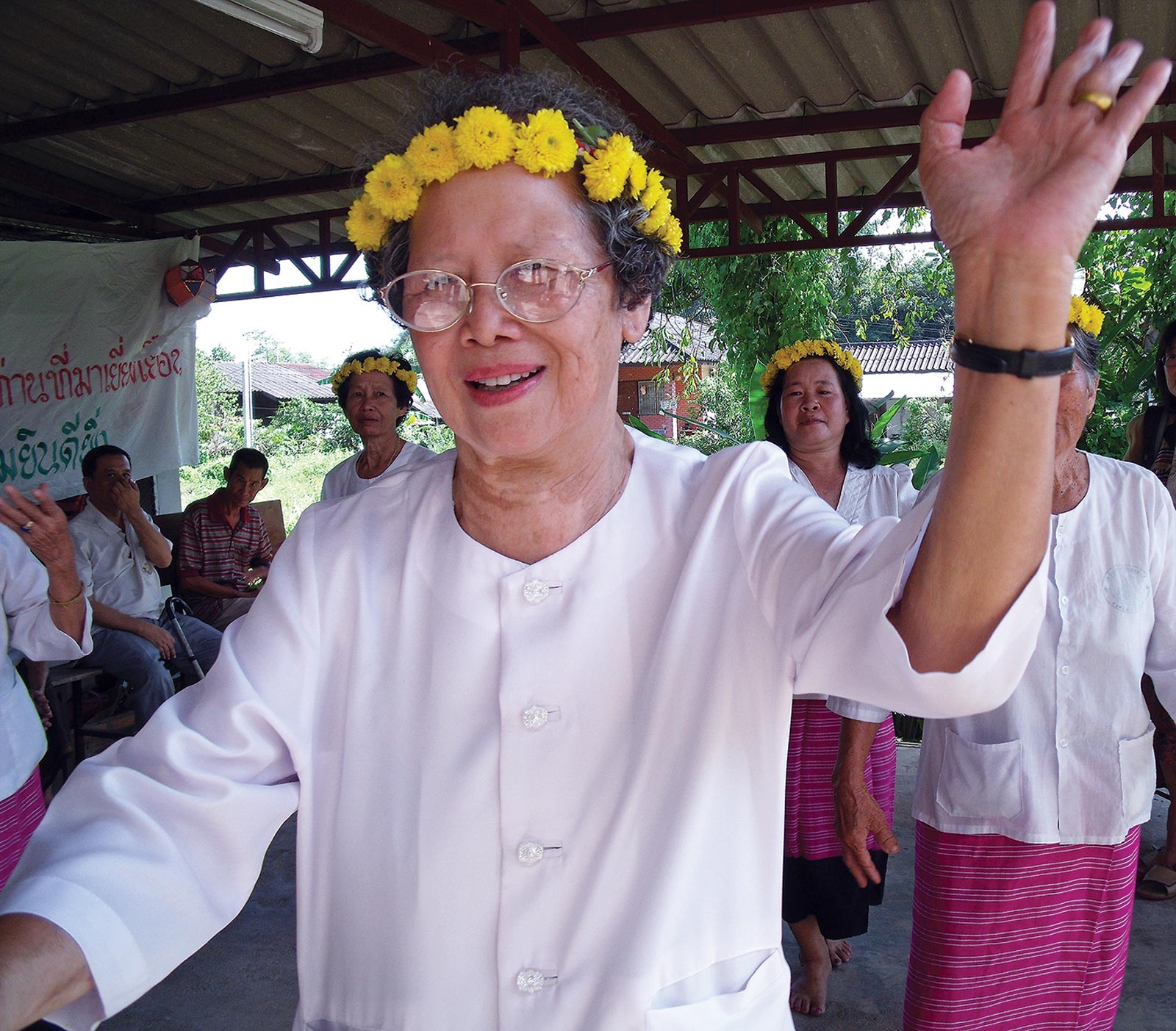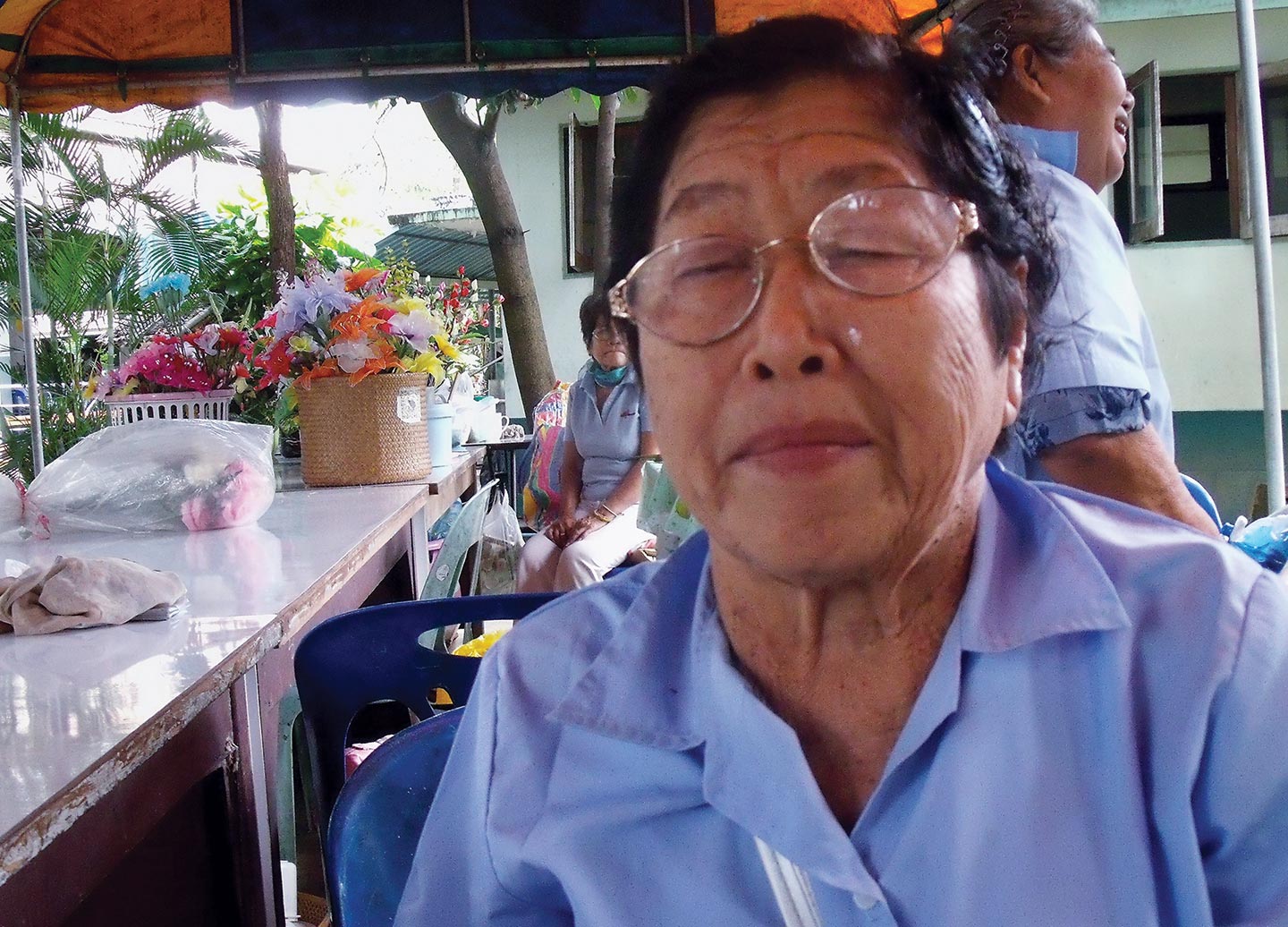Editor’s note: Across Southeast Asia, the number of people over 65 years old is rising steadily. And without the proper support structures in place to ensure that their retirements are free from poverty and fear, many old people left without a family to look after them will find their last days lonely indeed. In 2009, we travelled to Chiang Mai to witness the ways in which many old people were taking out a new lease on life.
In a room with strips of dried bamboo lying across a grey floor, Kham Bang Kattivong, 70, was busy weaving one of around 20 baskets she aimed to make each month. The work would earn her about 500 baht ($14), money intended to support herself and fund her granddaughter’s education.
Kham Bang’s husband died of lung cancer ten years ago, leaving a wife and two daughters to fend for themselves. In 2006 her daughters went to work in Malaysia as masseuses, one leaving a 12-year-old grandson behind with her.
“No rice, no farm, I am waiting for other people who want to employ me. Now I am too old, I cannot go to work in the field,” Kham Bang said.
Worldwide, the number of people age 65 and over is expected to increase from 207 million in 2000 to 857 million in 2050, according to a 2001 United Nations report. Thailand’s older generation is estimated to be world’s fastest-growing. As vulnerable members of society, the elderly face declining health, poverty and loneliness.
According to a December 2007 British Geriatrics Society report almost 75% of Thailand’s elderly live with their spouse and children, 16% live with their spouse and the rest live alone.
I miss my children. They visit me once a year on New Year’s Day
Rong Phroa, 67
Like Kham Bang, many Thai grandparents care for their grandchildren. 77% of people who live with HIV/AIDS are cared for by old people, said Eduardo Klien, regional representative of HelpAge International—Asia/Pacific, a non governmental organisation.
In such families the elderly work because when their adult children live with HIV/AIDS, they are forced to care for their offspring and re-enter the labour market to earn money to buy medication.
Even as they care for ill offspring, many elderly Thais must also face their own health problems, often related such chronic diseases such as diabetes and hypertension. Cases tend to increase as incomes decrease, with 80% of chronic disease deaths in Asia among low- and middle-income people, a percentage that Klien says is likely to increase in the near future.

The heavy aroma of medicines filled the air in the Thammapakorn home for the elderly in Chiang Mai, where Kiang Kanpan, a painfully-thin 89 year old, complained loudly about the pain in her hips and back.
“Sometimes I feel like someone is squeezing my heart,” Kiang said of the pangs, which doctors believed to be caused to kidney problems. She is one of 113 old people living at the home, a number that Suphakarn Unpho, a social worker with the ministry of social development and welfare, put down to lack of family support for those who are too infirm to fend for themselves.
Kiang’s neighbour, Rong Phroa, 67, also makes 500 baht a month from baskets, which is a fraction below the poverty line.
Rong tried to sing a song about his life, which he spends mostly alone, trying to weave baskets even though his right hand is paralysed.
Rong’s song is a sad one.
Of Thailand’s 30 million-strong workforce, about 9.4 million pay into the national social security system, said Chantana Boon-Arj, chief of the international affairs’ social security office.
In 1998, Thailand initiated a pension scheme that requires members to contribute each month, but meant that nobody would receive pensions for several years.

Earning 18 baht per day and lacking a pension, Rong must nonetheless see a doctor every month due to a serious motor accident 12 years ago. He is still in pain, but must manage alone as his two daughters live with their husbands.
“I live alone. Every day my younger brother brings me food,” Rong said.
“I miss my children. They earn money, just enough for their living so they have no money to send to me. They visit me once a year on New Year’s Day. I don’t know about my life for tomorrow, I live day by day”.
My work brings me fun and I lead a very active life
Bophan Sattitan, 81
Even though elderly people suffer from health problems, poverty and loneliness, they still have a lot to offer as they are the first teachers in their community, said Klien.
Bophan Sattitan, 81, the oldest woman in Huay Bong village, Sunsai district, Chiang Mai, said that she often gives young people advice and is happy to share experiences drawn from a long life.
“My work brings me fun and I lead a very active life,” she said.
For Klien, the elderly are not only part of society but can remain productive. “Elderly people can work together and still have the energy to work and be useful contributors to the economy,” he said.
Old people are a significant part of the electorate and will grow in importance as their numbers expand, with estimates suggesting that by 2050 the over-60’s will amount to almost one-third of the voting population in Asia. Vote-chasing politicians will have to listen to their concerns.
However some elderly in this part of northern Thailand are also coping with the consequences of HIV/AIDS in their families.
The sharp sounds of finger cymbals and the beat of drums heralded a group of ten women with yellow flowers in their hair who were moving their bodies slowly to the right and then the left. Their arms pointed one up and one down, following the rhythm of the music.

Clad in a thin white blouse and a smile, Changfong Fumfuey, 72, appeared carefree as she danced, but behind the smiles and lively eyes lies personal tragedy. Her remaining two sons have HIV/AIDS, while the eldest passed away 16 years ago at just 41.
“My son died in my arms. I didn’t have even enough money. I had to borrow from other people for his funeral. I felt I was going to die, and I was so tired,” said Changfong, tears gathering at the corners of her eyes when she talked about her past life.
Changfong’s eldest’s condition became serious in 1992 and he died after just four months, because at the time there was no treatment for HIV/AIDS sufferers in Thailand. She said she was too poor to take him to a doctor. Money that she and her husband earned from selling vegetables was only enough to feed their family.
“At the time a monk told me to fight the situation and to struggle,” Changfong said. “But what should I do? How should I do? I don’t know how to deal with my feelings. I sometimes go out walking just to talk to other people. I don’t want to stay alone.”
Changfong’s neighbours kept their distance from her because they knew her eldest son was living with HIV/AIDS. “Nobody wanted to see my face and talk to me because maybe they didn’t know what HIV/AIDS was. But I ignored them. I just cared for my son,” she said.
She tried to explain that people do not get HIV through normal social contact. “If this disease can transmit to other people through eating and sleeping, I may have HIV/AIDS from my son,” Changfong explained. She showed her friends her blood test from a doctor, which showed no trace of HIV/AIDS.
My son, he maybe forgets me because I am a weak old mother and poor
Lat Sivichai, 70
After her son died Changfong divorced her husband because she knew he had many partners and was afraid he would pass the disease on to her. Not long after their divorce, her husband died of AIDS.
In 1992 even the local doctors did not know about HIV/AIDS, she said. But one day a Christian organisation approached her. “Can I tell you one thing?” a member of the group asked. “You can tell me everything. I can accept all,” Changfong replied. She listened, and she started to understand HIV/AIDS.
Changfong now often joins seminars about the disease and how to look after sufferers, explaining to villagers about it through her own experience.
However, the shadow of the past always appears in Changfong’s life. She remembers that one year after her oldest son died, her two younger sons were diagnosed HIV-positive and she began the onerous task of caring for them. Before long, though, her life brightened.
In mid-March 1993, Changfong founded a group comprised of older people known as “We Love Health”. The organisation aimed to help elderly people get relief from stress and to increase their incomes. She said that the club grew from five members to a current roster of about 40.
“Before today my life was terrible. But after I formed a club, my life got better and I feel happy and relaxed,” Changfong said.
For other elderly in Thailand, loneliness tinged with despair has often a problem.
70-year-old Lat Sivichai shivered as a breeze rustled the palm tops. “My relatives have never visited me, even my sons,” she said.
Her song, if she had one, would make Rong’s seem exultant in comparison.
Lat’s husband was murdered many years ago. Her two sons left her for Bangkok after asking her for 2,000 baht each to find a job in the capital.

As they left, Lat recalled them saying: “Don’t worry mother, when we go to Bangkok we will send money to you.”
That was the last Lat heard from her boys.
In about 2004 Lat told Thai television network TV7 that she didn’t know how to contact her sons. Eventually, she met a friend of her sons and learned that the eldest child had died in a car accident and the younger son had got married.
“I didn’t know my son had died and I didn’t have a chance to attend my son’s wedding because nobody told me,” she said.
Then Lat began to cry bitter tears. Her hands tried to stem the flow, and finally she whispered.
“My son, he maybe forgets me because I am a weak old mother and poor.”


